By Wayne Gillam | UW ECE News
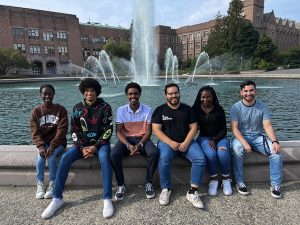
A Vision for Electronic Literacy & Access (AVELA) board members at Drumheller Fountain on the UW campus. In 2022, AVELA used funding from the UW ECE DEI Small Grants Program to help attract and retain a more diverse student body in the Department. From left to right: UW students Fatima Gbla, Kyle Johnson, Liban Hussein, Vicente Arroyos, Aisha Coara, Raul Villanueva. Photo courtesy of AVELA
Over the last couple of years, UW ECE has launched several successful initiatives that foster greater diversity, equity and inclusion within the Department. This work has been implemented with academic rigor and in partnership with the UW College of Engineering’s Office for Inclusive Excellence and the University’s Office for Minority Affairs & Diversity. UW ECE has also encouraged DEI-related research and activities among faculty and students that augment traditional technical research and courses of study.
Now, the Department is issuing a call to faculty, students and staff for new initiative proposals that, if approved by a review committee, will be supported by the 2023 UW ECE DEI Small Grants Program. Budgets up to $5,000 will be considered for initiatives ranging in duration from six months to one year. Proposals can be submitted online through April 30, 2023.
This year, the Small Grants Program is targeting four key areas that align with the Department’s DEI vision and goals:
- Collaborations with minority-serving institutions
- Enhancing and strengthening civility in UW ECE
- Understanding DEI issues within electrical and computer engineering
- Raising awareness of contemporary DEI issues
“The reason we’re soliciting proposals on an annual basis and supporting these initiatives is so we can build a solid DEI program,” said UW ECE Professor Denise Wilson, who is the Department’s associate chair for diversity, equity, and inclusion. “We want to build a DEI program that is distinct and making unique contributions among colleges and universities around the country while simultaneously supporting our Department and making it a better place to work and go to school.”
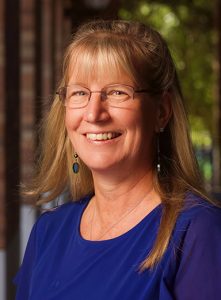
UW ECE Professor Denise Wilson
The Department has made good progress toward this aim under Wilson and her predecessor, UW ECE Associate Professor Sam Burden, who was associate chair for diversity, equity, and inclusion during the 2021–22 academic year. With their leadership and the support of the DEI advisory committee, which is made up of faculty, staff and students from across UW ECE, the Department has implemented nine different DEI-related initiatives in a little over two years.
Wilson emphasized the wide range of DEI initiatives at UW ECE and that she would like to see a broad spectrum of students, faculty and staff apply for this year’s grants.
“In our DEI effort at UW ECE, our initiatives themselves are diverse. But people who don’t explicitly read DEI literature or are not in an underrepresented group still might have a mistaken impression that this is not for them, it’s for those people ‘over there,’” Wilson said. “We definitely want to change that way of thinking. We want students, faculty and staff — including those from majority or overrepresented populations — to get involved and realize how they can be more diverse, equitable or inclusive in their own programs to the benefit of all.”
Below are a few examples of DEI initiatives at UW ECE from the 2021–22 academic year.
A Vision for Electronic Literacy & Access (AVELA) — Summer 2022 outreach and community building
Organized and led by AVELA student leaders
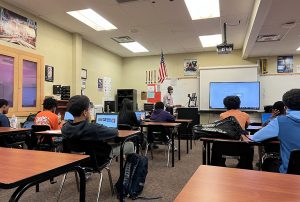
Students from Garfield High School in Seattle, Washington, participating in an AVELA summer website development class. This course was led by AVELA instructor Charles Bugre, a doctoral student from the UW Information School. Photo courtesy of AVELA
AVELA is a recognized UW student organization that conducts outreach to local K–12 students from underrepresented minority groups. Its members are minority students at the University who strive to bridge opportunity gaps in the public education system. AVELA brings science, technology, engineering and mathematics (STEM) to students, with the goal of sparking interest in STEM careers and higher education. In the process, AVELA members gain hands-on experience in mentorship, curriculum development and presentation of STEM activities to younger audiences.
In 2022, UW ECE supported an expansion of AVELA’s outreach to underrepresented minority students in elementary, middle and high schools in the Seattle area. This work included pairing
AVELA graduate and doctoral students with UW ECE undergraduates, mentoring and training them on how to work with K–12 students and lead outreach projects.
“To me, this initiative was about assisting students from underrepresented backgrounds who had made it to UW ECE and then empowering them to reach back to their own communities to help the next generation of students,” said Kyle Johnson, co-founder of AVELA and a recent UW ECE graduate (BSEE ‘20). Johnson is now a third-year doctoral student in the Paul G. Allen School of Computer Science & Engineering, advised by UW ECE alumnus and Allen School Assistant Professor Vikram Iyer.
“We pride ourselves on being able to reach out to the same communities that we come from,” added Liban Hussein, co-founder of AVELA and a second-year doctoral student at UW ECE, advised by UW ECE Assistant Professor Sajjad Moazeni. “We find that when students learn from someone who comes from a background similar to their own, they are more inclined to give back in the future, whether it’s through outreach or mentorship.”
AVELA classes and workshops at middle schools and high schools over the summer included Arduino basics, website development, and computer-aided design tools and applications. The group also led a science adventure camp for elementary school students with autism, which was held on the UW campus. During the initiative, AVELA members taught more than 200 underrepresented minority students in local elementary, middle and high schools, and AVELA members provided individual tutoring for students who were struggling in STEM-related subjects. This benefited K–12 students in the Seattle area and increased their interest in applying to colleges, universities and departments such as UW ECE.
“The students we’ve worked with are now applying for scholarships to colleges and universities,” Hussein said. “They’re more confident in themselves. That’s an influence we are proud to have had on them.”
AVELA also collaborates with faculty who have National Science Foundation grants, using supplemental grant applications and the group’s connections to help provide Research Experience for Undergraduates opportunities for underrepresented minority students. Several UW ECE faculty members have already partnered with AVELA in this way, and the organization seeks to expand these opportunities for AVELA students. The group encourages faculty interested in providing an REU opportunity for underrepresented students to contact the organization for more information.
AVELA is growing fast and works in partnership with the National Society for Black Engineers, the Society for Hispanic Professional Engineers, the Louis Stokes Alliance for Minority Participation, the UW Black Student Union and other affinity student groups on campus. AVELA also recently became a federally recognized nonprofit organization, which will help further support the recruitment of students from underrepresented minority groups to participate in AVELA’s outreach and mentorship activities.
Learn more about AVELA on the organization’s website and social media channels (Facebook, TikTok, Instagram, LinkedIn).
DEI Book Club
Led by John Nettles, UW ECE Assistant Director of Academic and Career Services, Professional Master’s Program
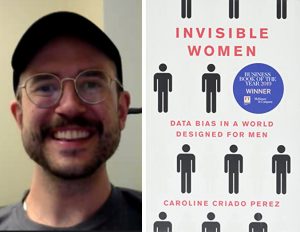
The DEI Book Club is led by UW ECE staff member John Nettles (left). This quarter, the Club is reading “Invisible Women: Data Bias in a World Designed for Men” by Caroline Criado Perez.
The DEI Book Club was established summer quarter 2022, and it is open to UW ECE doctoral students, faculty and staff. The Book Club is intended to be a professional development opportunity for people interested in creating inclusive spaces for those who have been historically underrepresented in electrical and computer engineering. The group meets once per quarter to discuss a book that focuses on diversity, equity, inclusion, and justice, along with ways to apply what is learned to UW ECE.
“I’m really passionate about providing opportunities for people who have been excluded in the past from institutions that weren’t created for them,” said DEI Book Club Director John Nettles. “I’m thinking about the little ways that culture shifts, and that is why I built an overall curriculum for the Book Club, because I wanted people to see how these topics are interconnected.”
Nettles’ curriculum for the Book Club has been developed so discussion of each book read by the group builds upon the next, yet the topics are flexible, so new participants can join and become part of the conversation at any time. Books being read and discussed by the Book Club include, “Emergent Strategy: Shaping Change, Changing Worlds” (summer quarter 2022), “So, You Want to Talk About Race” (autumn quarter 2022) and “Invisible Women: Data Bias in a World Designed for Men” (winter quarter 2023).
“One of the things we talk about in the Book Club is how we see a book changing how we work, navigate or what we think we need to do differently as individuals,” Nettles said. “DEI work at this level is more about the individual, and this is providing grassroots space for change. We need that, along with the administration talking about these issues. This is a way staff, faculty and Ph.D. students can do their part.”
Interested in joining the DEI Book Club? Contact John Nettles to learn more.
ECE Student Emergency Support Fund
Led by Whitney Thomas, Academic Counselor — Senior for Undergraduate Programs
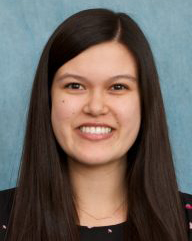
UW ECE staff member Whitney Thomas (above) came up with the idea for the ECE Student Emergency Support Fund and leads its implementation.
This fund serves to provide support for UW ECE students who are experiencing unanticipated hardship. Students can submit requests for financial assistance with unexpected expenses and situations such as health care costs, car repairs, legal fees, travel for family emergencies, stolen goods, and housing and food insecurity. The Fund launched in autumn 2022 and already has assisted several students with financial challenges, helping them to persist with their studies.
“Students have a lot of obligations. In addition to being students, they’re often working and must contribute financially to help their families,” said Whitney Thomas, who came up with the idea for the Fund and leads its implementation. “When all that piles on together, and an unexpected cost comes up, students can struggle with taking care of all their responsibilities. So, having a fund like this can give students a little bit to tide them over as they’re exploring their situation and finding other solutions that can help them.”
In addition to providing financial assistance to students who are in a tight spot, UW ECE academic advisers that review requests can point students to resources that can help them, even if the funding request isn’t approved. This can be valuable guidance during times when students may not know where else to turn. For that reason, Thomas emphasized that students should always feel comfortable applying to the Fund and asking for help.
“When a student is going through a unique, challenging time — a hardship — it can feel isolating. It can feel like no one is there to help you and that no one cares,” Thomas said. “I’m just hoping this kind of fund shows our students that we really do care about them. We want to try to do whatever we can to help them as our students.”
More information and resources for students are on the ECE Student Emergency Support Fund webpage. To learn more, contact Whitney Thomas.
Engineering CAReS
Led by UW ECE Professor Denise Wilson, Associate Chair for Diversity, Equity, and Inclusion
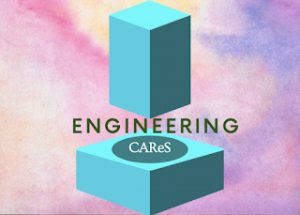
The Engineering CAReS project webpage notes that acquiring a healthy sense of belonging in engineering can sometimes feel like trying to fit a square peg into a round hole.
The Competence, Autonomy, Relatedness Survey (CAReS) project seeks to understand how well basic psychological needs of engineers are met in the workplace. Funds provided by UW ECE support incentives to complete the survey. The CAReS survey is open to anyone who has worked in engineering or computer science or worked closely with engineers or computer scientists over the last 20 years.
“We know a whole hoot-load about what’s going on with engineering students, but once they graduate, they fall into a data abyss,” said Denise Wilson, who is director of the CAReS project. “We just don’t understand what’s going on in the workplace very well at all.”
In contrast to most workplace surveys, which emphasize barriers hindering the advancement of working engineers, the CAReS project focuses on met, unmet and thwarted psychological needs at work. Wilson says that this is key to opening a broader array of potential strategies to build belonging, persistence and productivity in the engineering workplace, especially for those who are underrepresented in engineering disciplines.
“We in engineering tend to ignore human psychological needs, but those needs are still there, whether we ignore them or not. Engineers are still humans,” Wilson said. “So, we want to use the CAReS project to get down to the root of it all because a) it’s the right thing to do. People have needs, and they should be fulfilled in the workplace. And b) once you distill the issues down to needs, you have a much broader range of choices of how you can meet those needs.”
The CAReS project is being rolled out in two phases. The first phase was a 20-minute online survey distributed to 210 individuals who work in engineering. This initial survey was completed in December 2022, and it provided information Wilson and her research team are using to refine an upcoming survey in phase two of the project. After first phase data analysis is complete, the second survey will be sent out in 2023 to thousands of individuals across the nation who work in engineering. Wilson plans to distribute the survey results and analysis broadly, in traditional journal publications and through popular media.
“Our goal here is to support a better engineering workplace for a more diverse group of people,” Wilson said. “We want to disseminate not only a deeper awareness of the problems, but also potential solutions.”
For more information about the call for new DEI initiative proposals or any of the initiatives described in this article, contact UW ECE Professor Denise Wilson.

